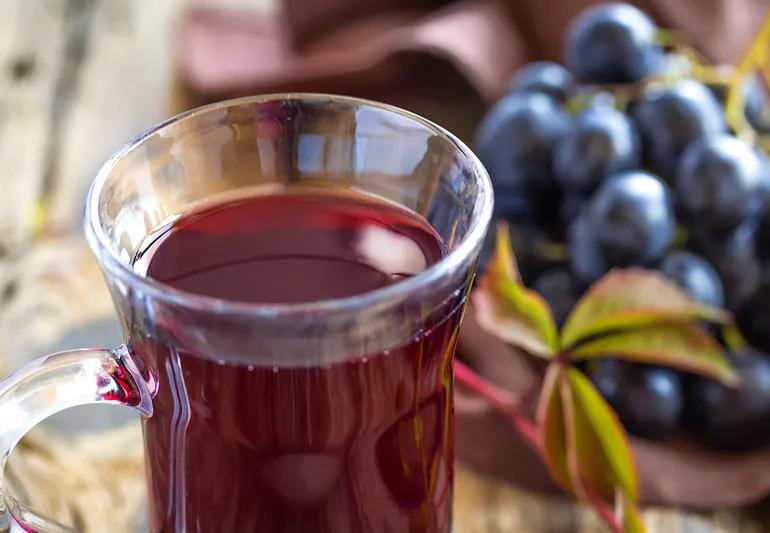Resveratrol is a powerful antioxidant that provides protective benefits for your heart, brain and body

You’ve heard an apple a day keeps the doctor away, but a glass of wine — or even a glass of grape juice — could keep you feeling healthy in a variety of ways, thanks to a key ingredient known as resveratrol. Before you uncork your next bottle or seek out supplements, registered dietitian Julia Zumpano, RD, LD, breaks down what you should know about resveratrol’s benefits.
Advertisement
Cleveland Clinic is a non-profit academic medical center. Advertising on our site helps support our mission. We do not endorse non-Cleveland Clinic products or services. Policy
Resveratrol is a polyphenol, a naturally occurring highly powerful antioxidant. Although you can find it in peanuts, blueberries and cranberries, it’s most prominent in the skin of grapes and shines through in natural grape juice and red wine.
“Red wine is fermented with grape skins, so it contains resveratrol,” says Zumpano. “There is some resveratrol in white wine, but red wine contains three to 10 times more resveratrol compared to white wine.”
Like other antioxidants, resveratrol contains various protective qualities that may help your body carry on a number of daily processes and fight off illness. And while there’ve been numerous studies documenting a wide array of antioxidants’ potential benefits that include anti-aging effects, anti-cancer effects and more, many more studies need to be done on resveratrol alone. However, there are several properties of resveratrol that might make these benefits possible.
We know resveratrol is an anti-inflammatory because it’s an antioxidant, so it affects cells in your body by protecting them from damage. Most notably, it helps with brain and heart inflammation by providing a protective lining for your blood vessels and preventing insult or injury. This means it could have neuroprotective qualities and help preserve memory and brain function, as well as prevent heart disease and strokes.
Advertisement
“Resveratrol and other antioxidants are kind of like Saran wrap for your cells,” says Zumpano. “They wrap around the cell like a nice layer, so when you have compounds floating around your bloodstream and the environment that are trying to attack and damage that cell, you have this extra layer of protection.”
Zumpano says antioxidants help with multiple systems in your body. A diet high in antioxidant-rich foods promotes high levels of HDL (good cholesterol) and low levels of LDL (bad cholesterol). “The foods that you eat affect your entire body — your cells, bones, blood and organs. The higher the antioxidant content, the greater the entire body is protected from disease and suppresses inflammation,” says Zumpano.
Polyphenols also appear to improve the function of blood vessels and may help slow down the formation of blood clots. Alcohol can also act as a blood thinner, so red wine, when consumed responsibly, can help reduce clot formation. Therefore, if you combine polyphenols and alcohol, you have an even greater blood-thinning effect.
Resveratrol has a fairly low toxicity level. It’s reasonably well tolerated up to 5 grams per day. Studies have indicated nausea, diarrhea, vomiting and other gastrointestinal issues can occur when consuming higher doses. But these higher doses cannot be reached by diet alone and are usually reached when you consume supplements.
To benefit from resveratrol, Zumpano suggests working 1 gram of resveratrol into your diet each day, and that it’s important this comes from natural sources. A glass of wine or grape juice is OK, but turning to resveratrol supplements may not be the right path to take, as too much of a good thing can sometimes present negative effects.
Supplements aren’t regulated by the U.S. Food and Drug Administration (FDA), so you can never be certain you are getting the amount of resveratrol that a product claims it provides. Plus, anytime you can tap a natural source, you’re bound to benefit from it.
“There is a certain amount of resveratrol that your body cannot absorb and it’s difficult to determine that amount,” says Zumpano. “The case with most supplements is you’re certainly going to absorb it and utilize it much better from a real dietary source.”
Advertisement
Learn more about our editorial process.
Advertisement

The tropical fruit is a good source of antioxidants and vitamin C

High amounts of cholesterol and saturated fat in red meat may be linked to heart disease

The leaves and pods from this tree are rich in essential nutrients

This starchy root vegetable is a staple in many global cuisines — but it has to be prepared correctly, or it can cause serious concerns

These delicate green sprouts can give you an extra dose of vitamin K and other nutrients — but they’re not safe for everyone

Edamame, lentils and chicken breast are good sources of protein

Eating this root vegetable can help support your eye, heart and brain health

The flavorful herb is full of antioxidants that may help regulate blood sugar

Wearing a scarf, adjusting your outdoor activities and following your asthma treatment plan can help limit breathing problems

Your diet in the weeks, days and hours ahead of your race can power you to the finish line

When someone guilt trips you, they’re using emotionally manipulative behavior to try to get you to act a certain way